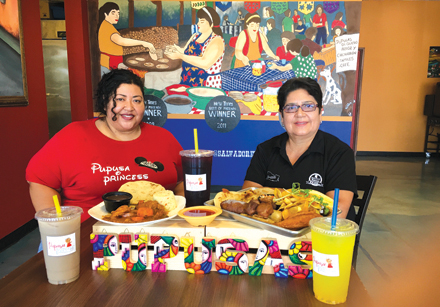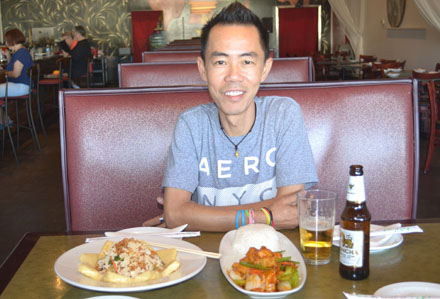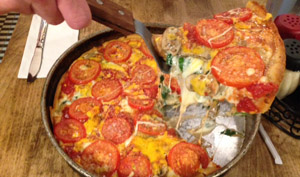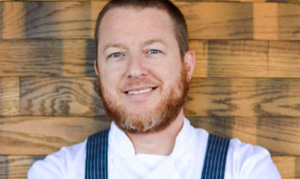Self-described “Pupusa Princess” Yesenia Ramirez is on a quest to introduce Valley diners to the cuisine of her native El Salvador.
She serves it up in her Salvadoreño Restaurant on Central Avenue, south of Dunlap Avenue, and promotes it in videos and at the annual Pupusa Festival.
Salvadoran cuisine is amalgam of traditions from Mexico, Central America and the Caribbean, Ramirez said.

Self-proclaimed ‘Pupusa Princess’ Yesenia Ramirez, left, and her mother Miriam Ramirez, have been bringing the cuisine of El Salvador to Valley diners since 2002. Customer favorites include pupusas, shown on the left, and a Salvadoran sampler (photo by Marjorie Rice).
“We have some elements from Mexico – commonalities like rice and beans and tortillas,” she said. “And we have an infusion of Caribbean, with Spanish influence. It’s a little bit of both worlds. You get rice, beans and tortillas and then you also get the plantains and the yuca (the edible root of cassava).”
Ramirez said her restaurant makes tamales that are stuffed with chipilin, chicken and cheese.
“Chipilin is a leafy green vegetable native to Central America and used a lot by the Mayans in their cooking,” she said. “If you cook it by itself, it doesn’t really taste like much, but when you put it in things, it brings out their flavor. We also make a vegan tamale with beans. The tamales are wrapped in plantain leaves and steamed.”
And then there are pupusas – probably the best-known Salvadoran staple. One publication called them “tortillas on steroids.” Pupusas are made with corn masa dough formed into a disc, then a filling is placed in the center and the masa is brought around it and sealed. The tortilla is flattened, then cooked on a grill, topped with curtido (vinegary pickled cabbage salad) and served with a savory – but not hot – sauce.
Fillings include pork, chicken, shrimp, beef and bacon; bean and cheese; potatoes and cheese; garlic and cheese; mushrooms and cheese – just about any combination you can imagine.
The most popular blend is the rebuelto pupusa, filled with beans, pork and cheese. Loroco, a Central American plant similar to squash blossom, combines with cheese for a popular vegetarian pupusa.
There’s no lard in the tortillas, so vegan choices also are available.
A good way to get introduced to the cuisine is to order the Salvadoran sampler, with pupusas; tamal de chipilin con queso; plantain chips; savory empanadas stuffed with beef, potatoes and cheese; fried yuca (cassava root) with fried pork belly; dessert empanada (plantain-based dough filled with custard); curtido (cabbage salad pickled with lemon juice or vinegar), and salsa.
New to the menu is Pollo Guisado, stewed chicken with potatoes and carrots.
“The spices we use are called relajo, which translates to ‘mayhem’ because it’s such a mix of tastes,” Ramirez said. “It has sesame seed, pumpkin seed, cumin, chile rojo (red chile) and other spices.”
The result is a savory blend, sort of like mole meets curry. It’s subtle rather than fiery. “It’s important to know that the spices we use are not hot,” Miriam Ramirez, Yesenia’s mother said.
Drinks include aguas frescas – mixtures of fresh fruit and water, wonderfully refreshing.
While Yesenia Ramirez doesn’t have formal culinary training, her family has deep roots in food services.
“My grandmother, back in El Salvador, used to sell food at the transportation centers, mining fields and farms,” she said. “She would make tamales and meals to take to workers in the mining fields and farms. We moved to California, and when my brother and I were like 11 or 12, my mom would make pupusas for us to sell at soccer games.”
The family moved to the Valley in 1996 and Miriam and Alfredo, who is Miriam’s husband and Yesenia’s father, opened the first of the family’s five restaurants – in Mesa in 2002. Each of those restaurants is family-owned, but a different family member runs each one independently.
“In our family we all have different talents so we work well together,” Yesenia Ramirez said. “I can do the admin, the social media, the networking. My dad does a lot of the supply stuff and my mom has always done the admin part, being in the kitchen and supervising that.”
The pandemic has caused some changes in service – a move to takeout and delivery with reduced hours until indoor dining was again allowed – but Yesenia’s technological prowess helped the transition go fairly smoothly.
“We already had the technology in place to do the takeout, the online ordering and the delivery apps,” she said. “We did have to edit the menu so people could read it in English as well as Spanish.”
Salvadoreño Restaurant, at 8911 N. Central Ave., is open from 9 a.m. to 8 p.m. daily. For more information, call 602-870-2955 or visit salvadorenorestaurant.com.










































